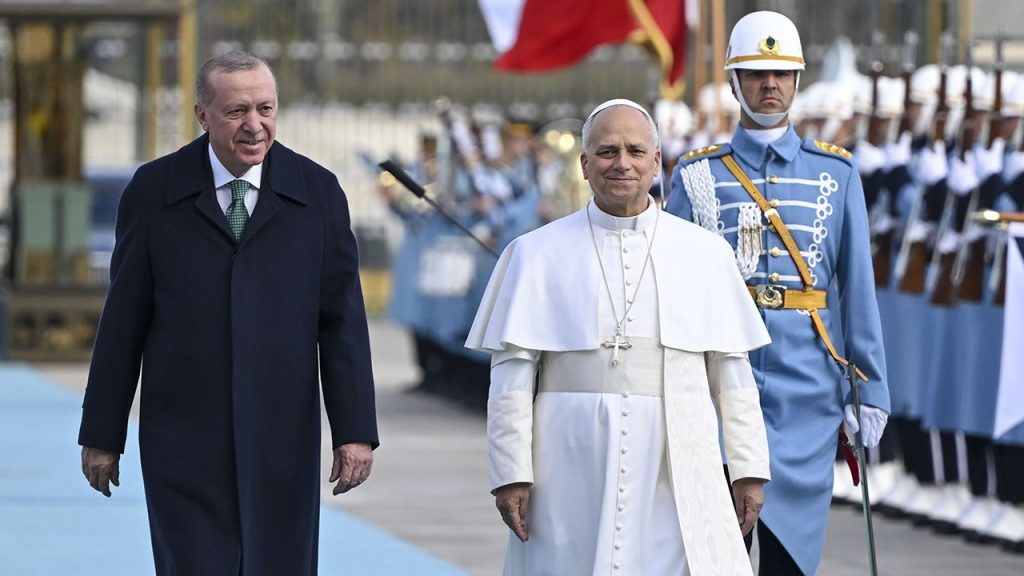Pope Leo XIV Makes Historic First Foreign Trip to Turkey and Lebanon
Pope Leo XIV has embarked on his first international journey as pontiff, choosing destinations with profound historical and contemporary significance for Christianity. By visiting Turkey and Lebanon, the Pope is making a deliberate statement that combines deep religious symbolism with geopolitical implications. His journey to commemorate the 1,700th anniversary of the Council of Nicaea in Turkey and his subsequent visit to crisis-stricken Lebanon represents an early indication of how this new Pope intends to exercise his influence on the world stage. According to Matthew R. Petrusek, senior director of the Word on Fire Institute, these choices reveal Pope Leo’s commitment to supporting Christians in regions where they face persecution or hardship. “By traveling to Turkey and Lebanon, I think Leo is telling Christians both in those countries and across the globe, ‘You are not forgotten; the Church stands with you,'” Petrusek explained to Fox News Digital.
The Turkish leg of the Pope’s journey carries immense symbolic weight for Christianity as a whole. His visit commemorates the First Council of Nicaea, convened in 325 AD in what is now Iznik, Turkey. This council produced the Nicene Creed, a fundamental statement of Christian belief that continues to unite Catholics, Orthodox believers, and Protestants worldwide. On Thursday, Pope Leo will travel by helicopter to Iznik to pray at the archaeological remains of the basilica where this historic council gathered seventeen centuries ago. To underscore the ongoing relevance of this anniversary, the Pope recently issued an apostolic letter titled “In the Unity of Faith,” emphasizing the Creed’s enduring role in Christian unity. Petrusek notes that this focus on the Nicene Creed makes a powerful statement about Christianity’s foundations: “Christianity is a creedal religion — it is based on shared, free assent to unchanging doctrines about Jesus Christ and the Church that give consistency and coherence to Christianity around the world.”
While in Turkey, Pope Leo will also engage in important ecumenical activities, including meeting with Ecumenical Patriarch Bartholomew I, visiting Christian communities in Istanbul, and celebrating liturgies. These encounters highlight the Pope’s apparent commitment to healing historical divisions within Christianity. As Petrusek observes, “The Creed includes the words, ‘I believe in one, holy, catholic and apostolic Church.’ I believe Pope Leo is also signaling that he wants to do everything within his power, in cooperation with the Holy Spirit, to heal the rifts that, sadly, still prevent Christ’s Church from being ‘one.'” This emphasis on Christian unity represents a continuation of efforts by recent popes to bridge theological and historical divides between different Christian denominations, particularly between the Roman Catholic and Eastern Orthodox churches.
The second half of Pope Leo’s journey takes him to Lebanon, a nation that has not hosted a papal visit for more than a decade. His predecessor, Pope Francis, had hoped to travel there but was unable to do so due to declining health. Lebanon holds special significance as the country with the largest proportion of Christians in the Middle East, though this population has decreased dramatically in recent years due to a perfect storm of economic collapse, political paralysis, and mass emigration. During his visit, the Pope will meet with political leaders, Christian and Muslim religious figures, and families affected by Lebanon’s overlapping crises. One particularly meaningful moment will come on December 2, when Pope Leo visits the Port of Beirut, site of the devastating 2020 explosion that killed more than 200 people and wounded over 6,000 – a tragedy that has become emblematic of Lebanon’s broader collapse.
The impact of a papal visit extends far beyond ceremonial appearances, carrying profound emotional and practical significance, especially in regions where Christians feel isolated or threatened. “It is hard to overestimate the positive effect having the pope visit your country has for Catholics, especially those who are suffering because of their faith,” Petrusek explains. “It is a reminder that the ‘Church’ is not an abstraction but, rather, a historical reality that goes back to Jesus Christ himself.” Beyond offering comfort to the faithful, the Pope’s presence sends a clear message to regional governments and those responsible for persecution: “Your crimes are not taking place in the dark; the world is watching.” This dual message of solidarity with the faithful and accountability for persecutors underscores the unique soft power the papacy continues to wield on the international stage.
As this journey unfolds, Vatican observers will be watching closely for indications of Pope Leo XIV’s priorities and approach to his pontificate. The Vatican is expected to emphasize themes of Christian unity, interfaith dialogue, and support for vulnerable communities throughout these visits. The Pope’s words in both Turkey and Lebanon will be scrutinized by regional governments and religious communities navigating complex landscapes of conflict, insecurity, and demographic change. Petrusek believes this trip embodies the core of Leo’s early papacy: “A papal visit brings immense hope and a renewed patience to persevere… suffering and death, especially as a result of persecution, not only doesn’t have the final say; when freely united to Christ on the Cross, it leads to nothing less than eternal life.” Through this carefully choreographed journey to regions where Christianity has deep historical roots but faces contemporary challenges, Pope Leo XIV appears to be establishing himself as a pontiff committed to both honoring tradition and addressing the pressing needs of Christians in today’s complex world.


